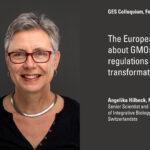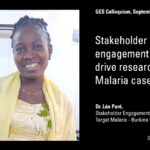
Léa Paré – Stakeholder engagement in gene drive research: A Target Malaria case study | GES Colloquium
Target Malaria's approach to stakeholder engagement is an iterative process, constantly adapting and evolving based on the context and values of our stakeholders, as well as new guidance and recommendations developed in accordance with international best practice....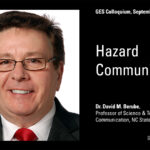
David Berube – Hazard Communication | GES Colloquium
Hazard Communication refers to communication to a limited group of stakeholders and involves three variables: hazard data, dosage data, and exposure data....Continue reading "David Berube – Hazard Communication | GES Colloquium"
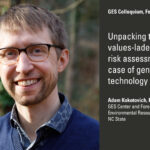
Adam Kokotovich – Unpacking the values-laden nature of risk assessment: The case of gene drive technology | GES Colloquium (Zoom)
While engagement and risk assessment are frequently discussed separately for gene drive technology, how do we incorporate engagement into risk assessment itself? ...
Rubén Rellán-Álvarez – Drinking from the maize diversity firehose | GES Colloquium (Zoom)
A discussion of the current state of native maize varieties breeding; their agricultural importance to maintain food security in developing countries; how researchers are using them to understand maize genetic diversity; and how they can coexist with modern, genetically engineered varieties....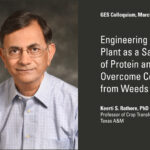
Keerti Rathore – Engineering of Cotton Plant as a Safer Source of Protein and to Overcome Competition from Weeds | GES Colloquium (Zoom)
Cotton, the most important natural fiber crop, also produces enough seeds containing ~10 million tons of protein. A broader use of this resource for food and feed is hampered by the presence of toxic gossypol in the seed....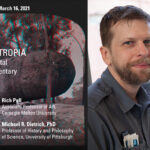
Rich Pell – CODEX ENTROPIA: An Experimental Sci-Fi Documentary | GES Colloquium (Zoom)
Screening the 3D anaglyph version of the 9 minute film CODEX ENTROPIA and discussing its implications and creation. (*3D glasses available in Hunt Library, on table across from elevator)...
Dan Jenkins on Regulation of Gene-Edited Produce | GES Colloquium (Zoom)
Overview of Pairwise and their mission to build a healthier world through better fruits and vegetables by bringing new varieties to consumers....Continue reading "Dan Jenkins on Regulation of Gene-Edited Produce | GES Colloquium (Zoom)"
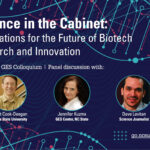
Science in the Cabinet: Implications for the Future of Biotech Research and Innovation | GES Colloquium (Zoom)
Hear a panel discussion from 3 experts on the future of biotechnology policy under the Biden administration. Panelists: Jennifer Kuzma, Robert Cook-Deegan, and Dan Levitan....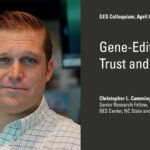
Christopher Cummings – Gene-Edited Food: Trust and Media | GES Colloquium (Zoom)
How we communicate about gene edited food influences trust, acceptance, and regulation....Continue reading "Christopher Cummings – Gene-Edited Food: Trust and Media | GES Colloquium (Zoom)"

Tenku Ruff: Ethics and GES: Exploring the ‘Right Use of Power | GES Colloquium (Zoom)
What steps can we take so our work is carried out in the best interest of all? This talk reviews a framework for scientists and lay people alike. ...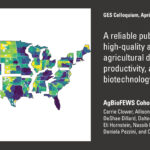
AgBioFEWS Cohort 1 Group Project | GES Colloquium (Zoom)
Cohort 1 group project: A reliable public dataset for high-quality analysis of agricultural diversity, productivity, and biotechnology in the US...Continue reading "AgBioFEWS Cohort 1 Group Project | GES Colloquium (Zoom)"

AgBioFEWS Cohort 2 Group Project | GES Colloquium (Zoom)
AgBioFEWS Cohort 2 Group Project - Understanding Biotech Controversy from a Moral Foundations Framework...Continue reading "AgBioFEWS Cohort 2 Group Project | GES Colloquium (Zoom)"

Spring 2021 Virtual Welcome Lunch | GES Colloquium (Zoom)
The Genetic Engineering and Society Colloquium is a seminar series that brings in speakers to present and stimulate discussion on a variety of topics related to existing and proposed biotechnologies and their place within broader societal changes....Continue reading "Spring 2021 Virtual Welcome Lunch | GES Colloquium (Zoom)"
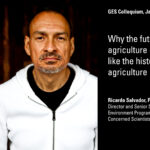
Ricardo Salvador – Why the future of agriculture cannot be like the history of agriculture | GES Colloquium (Zoom)
The existential quiz that will tell us whether humanity deserves to survive on planet Earth....